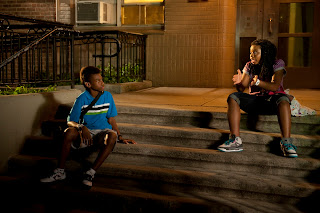Red Hook Summer
Directed By:
Spike Lee
Written By: Spike
Lee and James McBride
Starring: Jules
Brown, Clarke Peters, Toni Lysaith, Thomas Jefferson Byrd, Heather Alicia Simms,
and Spike Lee.
Director of Photography: Kerwin DeVonish, Editor: Hye Mee
Na, Production Designer: Sarah Frank, Original Music: Bruce Hornsby
“Spike
Lee is a white elephant artist whose best work is termitic,” said my cinephile
friend Trevor Link
recently on Twitter. And what better way to capture an artist who takes on
grand ideas (blackness, poverty, drugs, Huricane Katrina, 9/11, and beyond),
but often fills his films with humor, delight, and a true slice of life
sensibility. However, Lee hasn’t made a theatrical feature since 2008’s Miracle at St. Anna, a big budget WWII
film about black soldiers that lacked any of Lee’s flair that made him such an
impressionistic filmmaker early in his career. Thus it’s hard not to see the
character of Flik (Jules Brown), the young protagonist of his latest film Red Hook Summer, coming back to Brooklyn
as a metaphor for Lee himself, searching for his own roots that defined him as
America’s great black filmmaker (at one point, a character trying to fix Flik's hair notes his deep roots, perhaps the film's most meta-commentary moment).
Shot
on digital, Super 8, and an iPad 2 in only 18 days, Red Hook Summer is a major triumph by Lee, an improvisational and
meandering film that turns intensely on the themes of religion in the black
community. Red Hook Summer is
messy—perhaps one of Lee’s most winding and oblique features that seems to lack
any true narrative until its jaw-dropping, final third act—but Do the Right Thing and Jungle Fever were similarly twisting,
and Red Hook Summer sees Lee
attempting to regain some of that magic.
Most
of the magic comes in the form of Clarke Peters as Bishop Enoch Rouse, the
grandfather of Flik who is put in charge of the wily young boy from Atlanta.
Enoch is truly a God-loving man if there ever was one. He constantly fights
against Flik on his atheist background (as well as his vegan ways), convincing
the child that if he wants to enjoy his summer in Red Hook, he will first need
to love Jesus. Flik has no intention of doing so, spending time on his iPad,
sneaking potato chips from the Sunday School supplies, and hanging with an
outgoing and sassy girl his age named Chazz (Toni Lysaith). Their scenes have a
meet-cute style to them (though they’d be a little more fun if Brown and
Lysaith had smarter impulses as actors), which gives the film its loosest, most
freeing energy.
The
majority of Red Hook Summer centers
around the relationship between Flik and Enoch, as the two attempt to
understand each other, though there are a number of characters that come in and
spout their own life philosophies. We see the drunken Deacon, the wannabe
violent rapper, and various churchgoers, (plus a brief cameo by Do the Right Thing protagonist Mookie,
again played by Lee, and two characters from 25th Hour show up as well), all who have a different
relationship to the poverty around them. There are plenty of political
agendas—Lee is certainly interested in the black response to Obama, the
financial recession, and the gentrification of Brooklyn. However, I don’t think
these “talking points” represent Lee’s own views as much as he is attempting to
express that of a community. Lee’s camera is often more reserved than
usual—he’s capturing, not professing.
The
crux of the film though comes through three intense sermons given by Enoch,
which capture this disheartening spirit. Peters goes big and never stops, and
as the parishioners of Lil' Peace of Heaven Baptist Church clap at every
phrase, you feel the need to as well. Peters may be best known for his role as
the quiet, reserved Detective Freamon on The
Wire, and here he plays a whole different monster. But even past his loud,
commanding voice are his soulful eyes, and during the film’s late confession,
it’s his eyes that continue to resonate.
That
whole last act might feel like a different film, as a late twist leads the film
into a Christ-like punishment (a late sequence in which Enoch slowly walks from
his church to his small apartment, set to a gospel song called “Jesus is the
Lover of My Soul,” only lacks him carrying a cross to signify his role here).
But Red Hook Summer is essentially a conversion
narrative with the last act switched out. Flik and Enoch comes closer to
understanding each other, and you feel Flik might finally accept Christ, and
then Lee slams you from the side in his most stylized sequence, employing the
film’s only use of his
favorite “dolly” shot. Like in Do The
Right Thing, much of Red Hook Summer
before that feels casual, almost improvisational in its very loose filmmaking
(the camera floats around characters like a free spirit) and its lack of any
conventional narrative, but it all employs into this final act as the film
reveals the disturbing truth about faith and its power to both save and
corrupt.
Red Hook Summer departs on an ambiguous
note, but a hopeful one, as two characters exchange symbolic gifts of what
they’ve experienced over the hot season. And then Lee reaches the transcendent,
opting to recap the film through Super-8 cameras capturing the spirit of the
neighborhood the director used to live in. Lee doesn’t know what to make of his
characters and the crimes they have committed, but like in Do the Right Thing, he isn’t there to pass judgment, especially on
a location that means so much to him. His subjects may be white elephants, but
he prefers acting like a termite.



1 comment:
Was nice to see some great action. More on this
Post a Comment